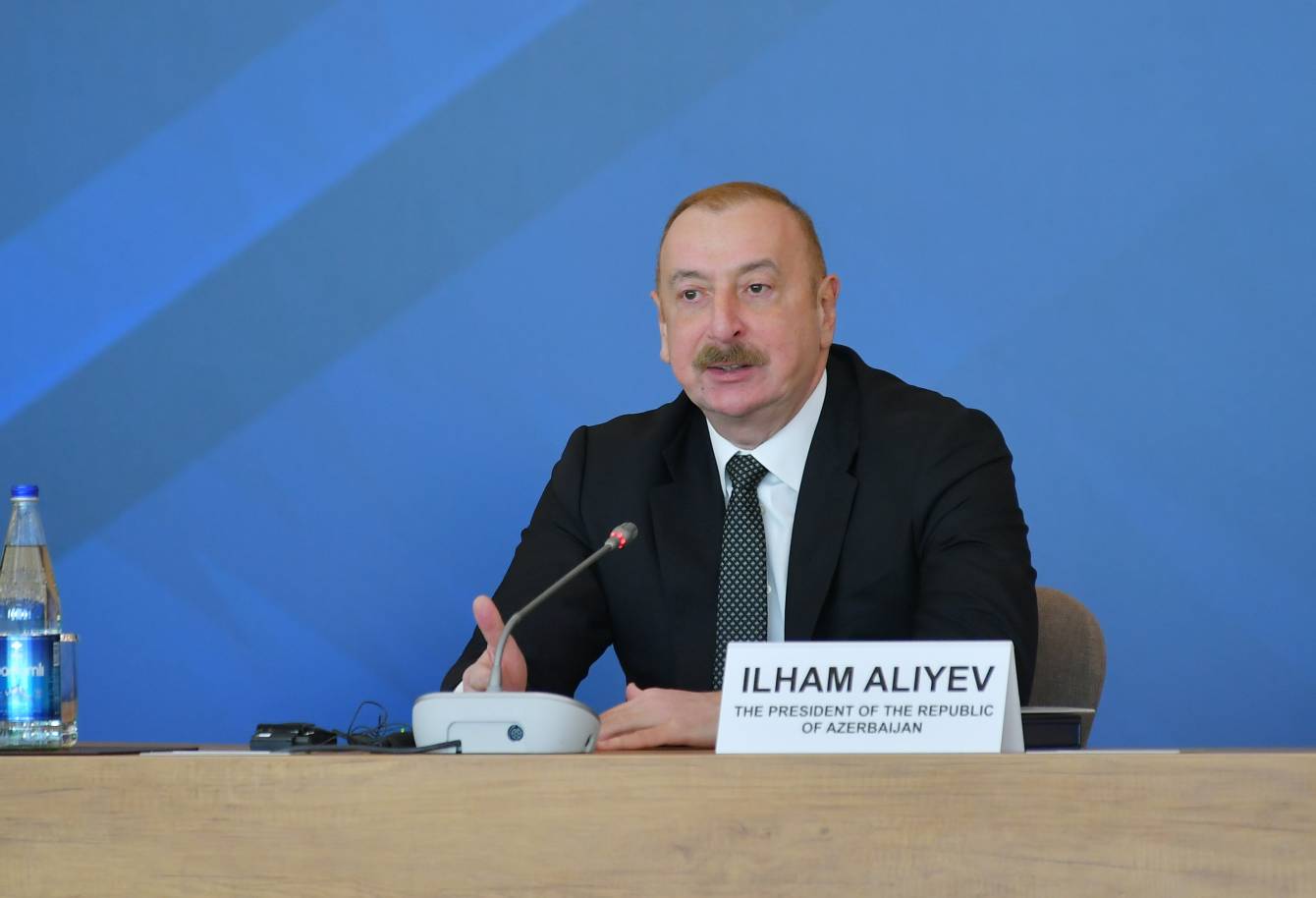Azerbaijan President Ilham Aliyev shared optimistic insights into the peace process with Armenia, highlighting the progress made since the war in 2020.
Speaking at the 11th Global Baku Forum, themed "Fixing the Fractured World", President Aliyev emphasized that at present the South Caucasus is closer to peace than ever.
"Now we're closer to peace with Armenia than ever before. Never in the history of the independence of the South Caucasus has peace been as close as it is today. This is a result of the Second Karabakh War. This is a result of the anti-terror operation we held last September, which lasted less than 24 hours and put an end to separatism forever in Azerbaijan, restoring our sovereignty and territorial integrity,” he said, referring to the 44-day Armenia-Azerbaijan war in 2020 and the local anti-terror measures in the Karabakh region of Azerbaijan last year.
President Aliyev reflected on the resolution of the former Karabakh (Garabagh) conflict, affirming that the conflict is concluded and the prospects for securing lasting peace are now greater, especially with the foreign ministers from Baku and Yerevan resuming peace talks.
He conveyed a strong desire for peace, stating that Azerbaijan has restored historical justice and international law, and now it is time to dissolve the animosity that has long existed in the region.
Armenia and Azerbaijan had long been at odds over the latter’s Karabakh (Garabagh) region. Following the Soviet Union’s dissolution in 1991, Armenia launched full-blown military aggression against Azerbaijan, marking the longest and deadliest war in the South Caucasus region. The bloody war ended with a ceasefire in 1994 and saw Armenia forcibly occupying 20 percent of Azerbaijan’s internationally recognized territories. Over 30,000 Azerbaijanis were killed, nearly 4,000 went missing, and one million were expelled from those lands in a brutal ethnic cleansing campaign conducted by Armenia.
On September 27, 2020, the Armenia-Azerbaijan conflict took a violent turn when Armenia’s forces deployed in occupied Azerbaijani lands shelled military positions and civilian settlements of Azerbaijan. During counter-attack operations, which lasted 44 days, Azerbaijani forces liberated over 300 settlements, including the cities of Jabrayil, Fuzuli, Zangilan, Gubadli, and Shusha, from a nearly 30-year-long illegal Armenian occupation. The war ended with the signing of a statement on November 10, 2020, under which Armenia also returned the occupied Aghdam, Kalbajar, and Lachin districts to Azerbaijan.
Post-war peacebuilding
Shortly after the 2020 war, the Azerbaijani authorities voiced readiness and determination to launch negotiations with Armenia that would ultimately bring long-awaited peace to the region.
In March 2022, Baku submitted five basic principles to Yerevan, including mutual recognition of territorial integrity and border delimitation activities. Since the end of the war, there have been a series of high-level meetings between Azerbaijan and Armenia mediated by Russian, European, and American officials.
However, due to Armenia’s territorial claims against Azerbaijan, despite its recognition of the country’s territorial integrity, the peace talks did not lead to any resolutions. The presence of the illegal Armenian separatist regime in the Karabakh region of Azerbaijan, and Yerevan’s financial and military support to it, blocked the attempts for a breakthrough.
Azerbaijan Armed Forces conducted one-day counter-terrorism measures from September 19-20, disabling almost the entire military infrastructure of the separatist regime. On September 20, the Armenian separatists agreed to full disarmament and withdrawal. On September 28, the so-called leadership of the Armenian separatist regime in the Karabakh region of Azerbaijan announced self-dissolution.
In a significant stride toward peace, the authorities of Azerbaijan and Armenia, on December 7, 2023, jointly declared direct agreements on crucial confidence-building measures. Following this declaration, on December 13, the two countries undertook a reciprocal exchange of detainees, with Azerbaijan releasing 32 military servicemen and Armenia reciprocating by freeing two Azerbaijani captives.
The dialogue further progressed with an informal meeting between President Aliyev and Armenia's Prime Minister Nikol Pashinyan on December 26, 2023, alongside an informal CIS Summit in St. Petersburg, Russia. Although the specifics of the discussions were not made public, Azerbaijani officials indicated that the talks focused on the peace agenda.
The peace process gained further momentum with a meeting between President Aliyev and PM Pashinyan in Germany on February 17, facilitated by German Chancellor Olaf Scholz.
Continuing the diplomatic efforts, Azerbaijan's Foreign Minister Jeyhun Bayramov and his Armenian counterpart, Ararat Mirzoyan, met on February 28 to deliberate on hastening the peace process, in the presence of German Foreign Minister Annalena Baerbock.
Despite the absence of a significant breakthrough in normalization efforts since 2020, the mutual commitment to achieving peace, especially without external mediation, fuels optimism. The anticipated peace treaty between Baku and Yerevan holds the promise of resolving the border delimitation issues and unblocking regional transportation links, thereby fostering stability and cooperation in the region.







 Armenian sappers commenced on Monday mine-clearance operations in the territories adjacent to the Saint Mary Church in village of Voskepar (Armenia...
Armenian sappers commenced on Monday mine-clearance operations in the territories adjacent to the Saint Mary Church in village of Voskepar (Armenia...
 Iran and Pakistan have signed eight cooperation documents in various fields, and agreed to strengthen ties to fight terrorism in the region.
Iran and Pakistan have signed eight cooperation documents in various fields, and agreed to strengthen ties to fight terrorism in the region.
 President Aliyev emphasized the critical role of the North-South Transport Corridor in fostering transport cooperation between Azerbaijan and Russi...
President Aliyev emphasized the critical role of the North-South Transport Corridor in fostering transport cooperation between Azerbaijan and Russi...



